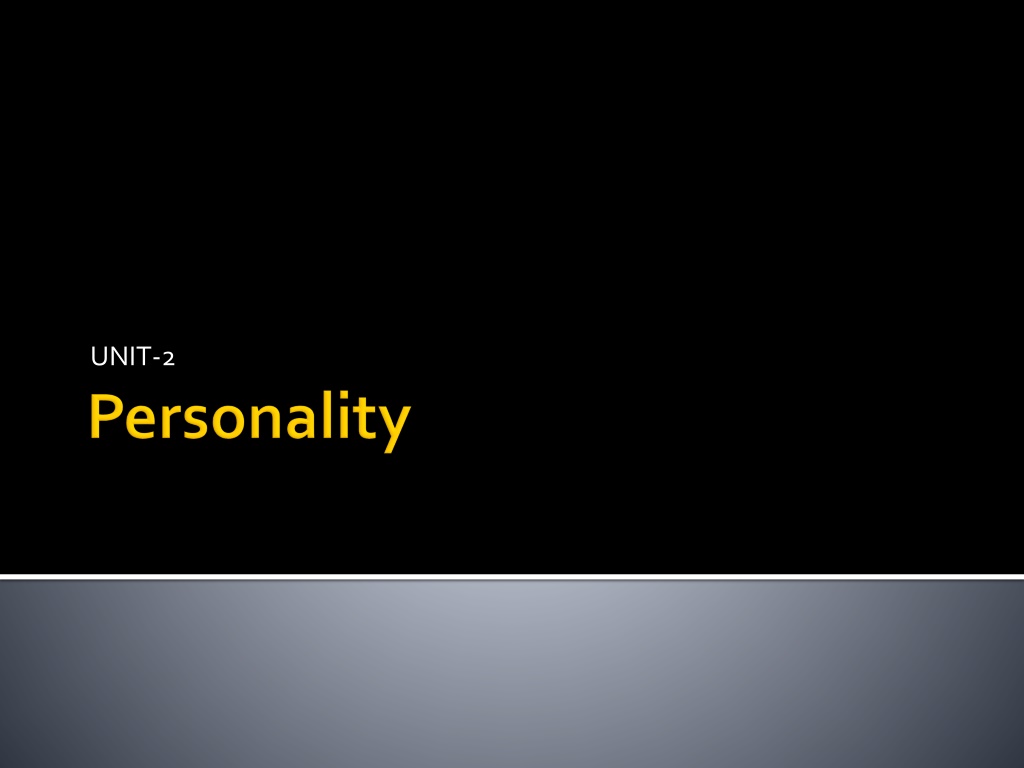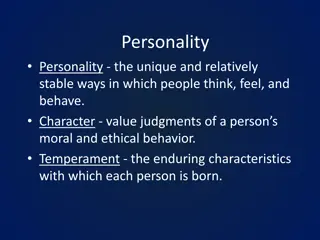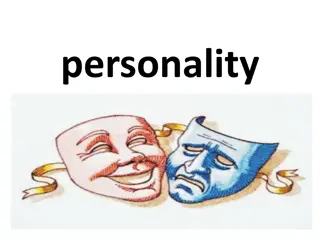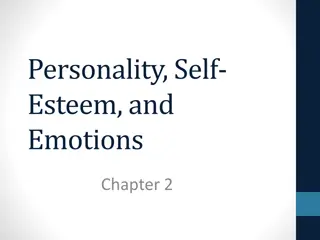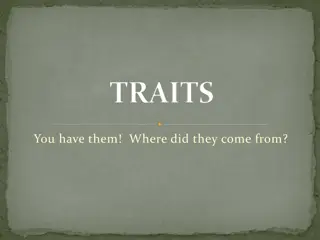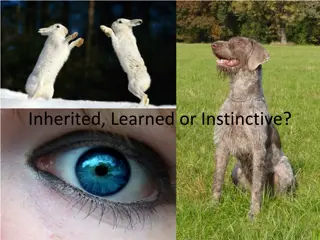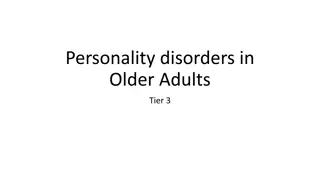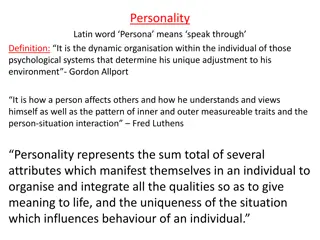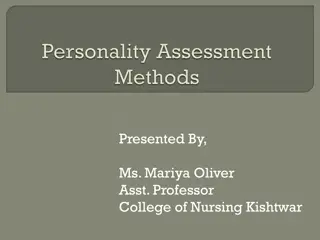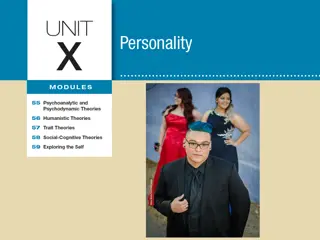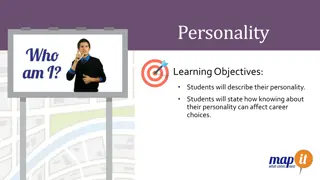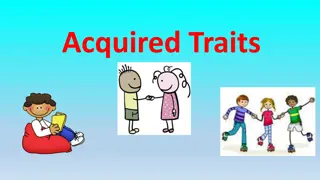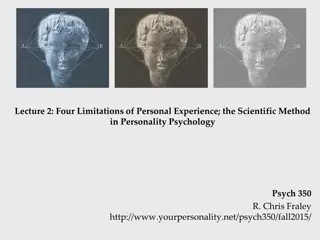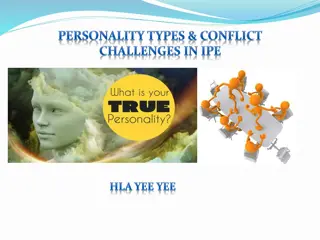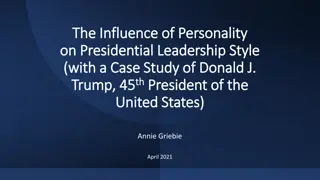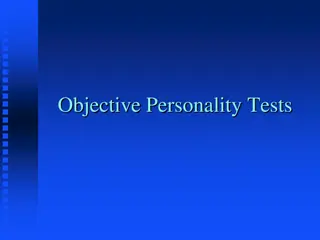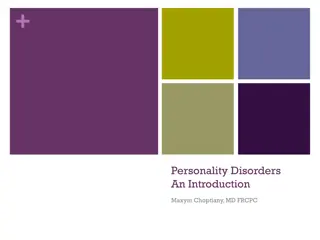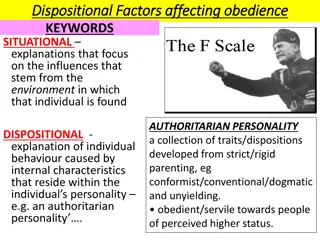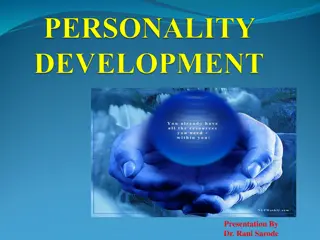Understanding Personality: Traits, Characteristics, and Influencing Factors
Personality is the unique combination of physical, mental, and behavioral traits that define an individual. It encompasses characteristics like smartness, dress sense, attitudes, and values. Personality is influenced by biological, environmental, and situational factors, and can be analyzed through various theories such as trait theory and social learning theory.
Download Presentation

Please find below an Image/Link to download the presentation.
The content on the website is provided AS IS for your information and personal use only. It may not be sold, licensed, or shared on other websites without obtaining consent from the author. Download presentation by click this link. If you encounter any issues during the download, it is possible that the publisher has removed the file from their server.
E N D
Presentation Transcript
MEANING The overall profile or combination of characteristics that capture the unique nature of a person as that person reacts and interacts with others. It combines a set of physical and mental characteristics that reflects how a person looks , thinks , acts and feels. Personality traits help the marketers to describe and differentiate among individual which can be further used in finalizing their marketing strategies.
It includes ones smartness, dress sense, popularity, way of speaking, height, physical aspects. Narrow concept It considered our attitude, values, learning, preferences, likes and dislikes etc. Broader concept
smartness dress sense physical aspects. popularity way of speaking height
Personality may be understood as the characteristics pattern of behavior and modes of thinking that determine a person s adjustment to the environment. HILGARD Personality is, existence as a person , the assemblage of qualities , physical , mental and moral that set one apart from others , distinctive individually , as he is a man of strong personality , too. WEBSTER S NEW AMERICAN DICTIONARY
PERSONALITY IS WHAT A FRAGNANCE TO A FLOWER ..
NATURE OF PERSONALITY 2.ENDURING IN NATURE 1.CONSISNT IN NATURE 4. IT REFLECT INDIVIDUAL DIFFERENCE 3.PERSONATY CAN CHANGE ALSO
. 1.BIOLOGICAL FACTORS 2.ENVIORNMEAL FACTORS 3.SITUATIONL FACTORS HEREDITY BRAIN PHYSICAL FEATURES CULTURE FACTOR FAMILY SOCIAL FACTOR
1.INTRA-PSYCHIC THEORY 2.PHYSIOGNOMY AND PSYCHOLOGY THEORIES 3.TRAIT THEORY 4.SOCIAL LEARNING THEORY 5.SELF CONCEPT THEORY
. Also known as PSYCHOANALYTICAL Theory . SIGMUND FREUD developed this theory on the premise that unconscious needs or drives are all root forces determining human motivation and personality.
1) THE CONCEPT OF ID:-It is governed by the principles of GREED AND PLEASURE . People with ID aspects are largely childish ,irrational, never satisfied ,demanding .People are entirely unconscious and no capable of dealing with objective reality . The methods of dealing with tensions by ID are:- PRIMARY PROCESS REFLEX ACTION
2) THE CONCEPT OF EGO:-EGO is conscious part of human personality and is based on reality Principle . It checks the ID through logic intellect . It has the ability to distinguish between mental images and actual source of tension release and it responds to the real source of tension reduction. TENSION REDUCTION TASK:- Observing accurately what exists in the outside world i.e. Perceiving. Recording these experiences carefully and remembering. Modifying the external world in such a way as to satisfy the instinctual wishes i.e. acting.
3) THE CONCEPT OF SUPER EGO:-It represents system of values , norms and ethics that guide and govern a person to behave properly in the society . It represents the ideal rather than real , defines what is right and good and it influences the individual to strive for perfection. EXAMPLE OF SUPER EGO Sarah knew that she could steal the supplies from work and no one would know about it. However she knew that stealing was wrong, so she decided not to take anything even though she would probably never get caught .
CRITICISM OF THE THEORY Freud s theory is long, poorly based on theoretical conceptions. However , it does not provides any measure for its scientific verification and validity. The theory is not found very relevant from behavior point of view.
. These theories represent an attempt to scientifically describe personality by classifying individuals into convenient categories. a)SHELDON s PHYSIOGNOMY THEORY:-WILLIAM SHELDON has presented a unique body type temperamental and model that represent a link between psychological traits and characteristics of an individual with his behavior. b)CARL JUNG s EXTROVERT-INTROVERT THEORY:-Carl Jung one of Freud's students proposed his own two part theory of personality . Jung s approach is also termed as ANALYTICAL PSYCHOLOGY
BODY BUILDS PERSONALITY CHARACTERSTICS ENDOMORPH (Bulky , fat) Friendly , people oriented seeks others when in trouble , slow to react ,loves to Eat . Spend on a lot of shopping on food and other luxuries. Seeks physical adventure , enjoy Exercises , aggressive, risk taker, competition oriented. Spend a lot on their Physique , sports and adventure activities. MESOMORPH (Strong , athletic) Like privacy , socially inhabited ,quick to react and hypersensitive to pain ,Spend a lot on books , musical instruments and on other intellectual activities. ECTOMORPH (Thin , long, poorly developed physically)
INTROVERT EXTROVERT Like quiet environment for concentration. Like variety and action. Tend to be careful with details dislike sweeping statements. Tend to work faster and dislike complicated procedure. Have trouble remembering names and faces. Are often good at greeting people. Work contentedly alone. Like to have people around. Have some problem in communicating. Usually communicate freely. Like to think a lot before they Act , sometime without acting. Often act quickly sometimes without thinking.
INTROVERT EXTROVERT Tend not to mind working on one project for a long time uninterruptedly. Are very often impatient with long slow jobs. Dislike telephone intrusions and interruptions. Often do not mind interruptions of answering the telephone. These are quite , inward directed People , less sociable , absorbed in inner life , subjective oriented. These are Friendly ,optimistic ,outgoing , so Cable , a reality oriented. They spent less money on entertainment food and adventure activities they spent on books and research. They want variety, spent money on people and on social gathering.
. According to J.P.GUILFORD, Trait means any distinguish relatively enduring way in which one individual differs from another. The trait theory states that human personality is composed of a set of traits that describe general response patterns.
Traits are common to many individuals but vary in absolute amounts between two individuals. Traits are relatively stable , their consistent occurrence influence the human behavior. One s trait can be inferred by measuring his/her behavioral indicators.
Personality Traits Enduring characteristics that describe an individual s behavior. The Myers-Briggs Type Indicator (MBTI) The Big Five Model
Personality test to determine how people usually act or feel in particular situations. Classifications: Extroverted (E) or Introverted (I) Sensing (S) or Intuitive (N) Thinking (T) or Feeling (F) Perceiving (P) or Judging (J) Combined to form types, for example: ESTP INTJ
Classifications Extraversion friendly, outgoing spend a lot of time maintaining and enjoying Agreeableness Highly agreeable = value harmony more Low agreeable = focus more on their own needs Conscientiousness Highly conscientious = pursues fewer goals, Low conscientious = tend to be more easily distracted
Emotional Stability Positive emotional stability = calm, enthusiastic Negative emotional stability = nervous, depressed, Openness to Experience Extremely open = fascinated by novelty Not open = appear more conventional
Locus of Control Machiavellianism Self-Esteem Self-Monitoring Risk-Taking Type A Personality Type B Personality Proactive Personality
The degree to which people believe they are in control of their own fate. Internals Individuals who believe that they control what happens to them. Externals Individuals who believe that what happens to them is controlled by outside forces such as luck or chance.
Degree to which an individual is pragmatic, maintains emotional distance, and believes that ends can justify means.
Individuals degree of liking or disliking of themselves.
A personality trait that measures an individual s ability to adjust behaviour to external situational factors.
Refers to a persons willingness to take chances or risks.
Moves, Impatient Multitasks Dislikes leisure
Never suffers Doesn t need to display Plays for fun Can relax
A person who identifies opportunities, shows initiative, takes action, and perseveres until meaningful change occurs.
Traits may be too abstract. Trait approach focus on isolated trait without specifying how these traits are organized within the personality. Without knowing which trait are more important and how they are related to other traits of an individual it is not possible to make adequate description of an individual s personality. Another fundamental problem of trait theories is that they are essentially descriptive rather than analytical.
. The main focus on social learning approach is on the pattern of behaviour the individual learn in copying with environments.
Much of human learning is observational in nature and likewise people design his decision by observing other known people. .
THE REINFORCEMENT THAT CONTROLS THE EXPRESSION OF LEARNED BEHAVIOUR MAY BE:- DIRECT OBSERVATIONAL SELF ADMINISTERED
It over emphasizes the importance of situational factors in behavior and neglects the individual differences. . The experimental methods used by social learning theorists are particularly sensitive to the impact of situational variable.
. Self concept is defined as the totality of the individuals thoughts and feelings having reference to herself / himself as an object.
. 1. The desire to achieve self- consistency.. Self concept 2. The desire to enhance one s self esteem Self concept
. IDEAL SOCIAL SELF ACTUAL SELF IDEAL SELF EXPECTED SELF
